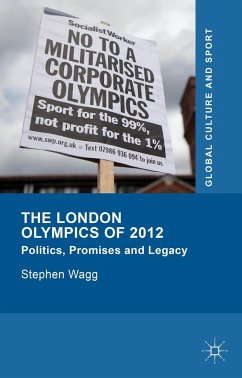Analysing the politics of the 2012 London Olympics, Stephen Wagg examines the framing of London's bid to host the Games, arguments about the Games' likely impact and the establishment of 'Fortress London' to protect the Games. The book asks who won, and who lost out, in this important event as well as exploring its media coverage and legacy.
"Stephen Wagg's book makes an invaluable contribution to the growing body of critical literature on the Olympic industry [...] it debunks Olympic industry hype and documents the damaging impacts on individuals and communities" Professor Helen Jefferson Lenskyj, University of Toronto, Canada
"The politics of sport are systemically exposed in this compelling analysis of the London Olympics. Writing within the critical Olympic Studies tradition that he has helped to establish, Stephen Wagg examines the Games from the bid phase to the post-2012 sporting and urban legacies that successive governments promised would arise from hosting the event. The author provides a sharply argued and accessible critique of the UK's political class and its collaboration with the Olympic industry in the staging of London 2012." Professor Gavin Poynter, University of East London, UK
"The politics of sport are systemically exposed in this compelling analysis of the London Olympics. Writing within the critical Olympic Studies tradition that he has helped to establish, Stephen Wagg examines the Games from the bid phase to the post-2012 sporting and urban legacies that successive governments promised would arise from hosting the event. The author provides a sharply argued and accessible critique of the UK's political class and its collaboration with the Olympic industry in the staging of London 2012." Professor Gavin Poynter, University of East London, UK








